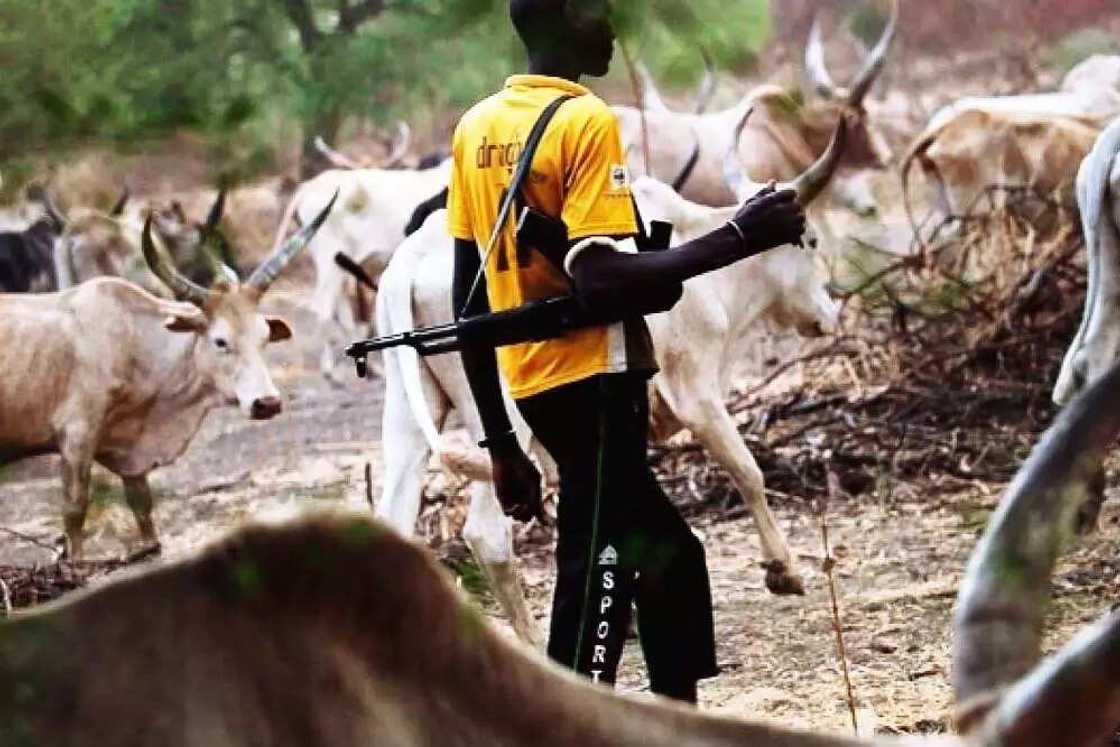Agatu: Woman tells how her son and brother were massacred
- On Saturday, March 5, Fulani herdsmen invaded Agatu LGA reportedly killing 300 people
- The death toll has been described as exaggerated by police
- A local woman said her son, a medical doctor, and her brother were killed during the attack
- She said the conflict between natives and herdsmen started long ago
- The minister of agriculture and rural development, Audu Ogbeh, a native of Idoma, said that no-one would drive the Idoma from their land

A woman has told how her her son, a medical doctor, was killed in the conflict that engulfed the Agatu community in Benue state.
Kasuwa Gabriel, who spoke at the Agatu town hall meeting in Abuja on Friday, March 11, said the invasions by the herdsmen started in 2013.
On Saturday, March 5, some Fulani herdsmen invaded Agatu local government, an Idoma community in the north central Benue state.
The Fulani were reported to be bent on taking over the Agatu area. They were said to have indicated that the grass in the Agatu is good for their grazing animals.
Mrs Gabriel said that on that day she was out farming on her family's land when some herdsmen approached and pursued her and other women from the farmland.
“I and the other women, we went back to tell our husbands that the Fulani people pursued us from the land,” Gabriel said.
She said: “My husband said why will that happen since we have never had problem with them, why are they wasting our crops?”
Gabriel said the herdsmen, however, succeeded in overpowering the natives of the community, pursing them out of their homes.
She said the herdsmen also succeeded in killing her son who she managed to train as a medical doctor in a Nigerian university.
"My own brother who was living with me was also killed,” she continued, speaking in Idoma dialect.
READ ALSO: Herdsmen attacks: FG plans 50,000 hectare grazing reserve in 6 months
Mrs Gabriel also said that she had no family members or relations and that the dress she was wearing at the meeting was given to her at an internally displaced camp in Otukpo, an area in Benue state.
Two other men from the Agatu community who spoke at the meeting said they were living off relief by good samaritans in Otukpo.
Also speaking, the chairman of Agatu network forum in Abuja, Chris Eneche, said it was important government takes adequate responsibility for those affected by the crisis in the area.
Eneche said compensation should be paid to immediate families, and there should be on the spot rehabilitation of schools, roads and various facilities destroyed by the herdsmen.
He also recommended the immediate relocation of the herdsmen from the affected communities, permanent military posts and rehabilitation of major roads for easy access by military personnel and relief material donated to those directly affected by the crisis.
“The relief materials are coming, no doubt but you know what we call the Nigeria factor, the relief materials never get to these people who are displaced and need this items,” Eneche said.
Also, the founder of the Brekete Family, a radio show in Abuja, Ahmed Isa, sympathizing with the Idoma people said it is difficult to understand why it took the Nigerian government a long time to act on the crisis in Agatu.
Isa, speaking in Pidgin English said: “The thing wey dey happen for Agatu suppose chuck us for liver; I just dey wonder why it took the government so long to act on this.”
He further encouraged a fundraising dinner for those affected and currently displaced by the massacre in the Agatu community.
He added that the accounts of the funds raised should be managed by those directly affected while the natives of Agatu and the Idoma people as a whole should be involved in supervising the use of the funds.
READ ALSO: Senate name those behind Agatu massacre
But a native of Idoma, Enyanatu Ifenne, said the crisis in the area must be handled immediately devoid of all political undertones.
Ifenne said: “The crisis in Agatu is not a tribal war, it is not a religious war but a structural problem.”
She said the structure of the Nigerian government system must redressed to meet the immediate needs of the people.
She said it is disheartening that when issues arise at the grassroots level it has to take the efforts of the state government or even the federal government to address such issues like the crisis in Agatu.
However, making an appearance, the minister of agriculture and rural development, Audu Ogbeh, who is also a native of Idoma said efforts are being made to ensure that the crisis is addressed.
“I have told the president, we will move the cows to their states of origin, we have to grow the paddocks and move them,” Ogbeh said.
The minister said he would meet with the inspector general of police, Solomon Arase, and the minister of internal affairs, Abdulrahman Dambazau, to ensure that measures are taken to prevent further attacks from the herdsmen.
Ogbeh said: “Nobody is going to drive Idoma people out of Idoma land; we are hardworking, committed and hospitable people but nobody will drive us out of our land.”
Meanwhile, the Nigerian Senate has said that Boko Haram members are behind the March 5 killings in Agatu and not Fulani herdsmen.
The Senate in a resolution said the Boko Haram terrorists who parade themselves as herdsmen in these communities must be wiped out.
Source: Legit.ng


